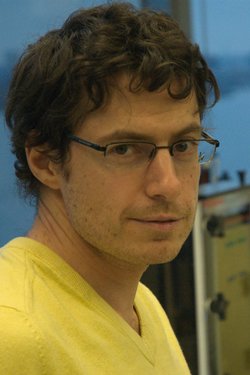Evgeny Nudler
2010 Regional Award Winner — Faculty

Current Position:
Professor of Biochemistry & Molecular Pharmacology, Investigator, Howard Hughes Medical Institute
Institution:
New York University School of Medicine
Discipline:
Biochemistry & Structural Biology
Areas of Research Interest and Expertise: Transcriptional Mechanisms, DNA Maintenance and Repair, Cellular Stress Responses and Aging, Gasotransmitters
Biography:
SM, Genetics, Moscow State University
PhD, Biochemistry, Institute of Molecular Genetics, Moscow, Russia
The work in the Nudler Laboratory covers a wide range of topics on gene regulation and stress response in prokaryotic and eukaryotic species. The current projects can be divided in four major groups:
Transcriptional Mechanics: with a particular focus on the elaborate mechanics of the elongation phase of the transcription cycle and its interplay with other major cellular processes, such as translation, replication, and repair of DNA.
Bacterial Gas Defenses: Nitric oxide (NO) and hydrogen sulfide (H2S) are well known signaling molecules in mammals. However, their functions in common bacteria are largely unknown. Dr. Nudler and his colleagues have shown that various bacterial species generate NO and H2S enzymatically from arginine and cysteine, respectively, and that these two gases function to protect bacteria from oxidative stress and a wide range of antibiotics. They are currently elucidating the molecular mechanisms of such regulation at the transcriptional and post-transcriptional levels.
Heat Shock Response: Heat shock genes encode molecular chaperones and other cytoprotective molecules that prevent accumulation of damaged proteins. In eukaryotes, synthesis of heat shock proteins (HSPs) is regulated primarily at the level of transcription by a master activator HSF1. Dr. Nudler and his colleagues have identified a nucleoprotein complex, containing the translation elongation factor eEF1A1 and a non-coding RNA that is required for HSF1 activation. They also showed that eEF1A1 orchestrates the entire process of heat shock response (HSR), from the transcriptional activation of heat shock genes to the stabilization, transport, and translation of their mRNAs.
Bacteria-Host Interaction and Aging Mechanisms: Using the round worm Caenorhabditis elegans as a model system to investigate how commensal bacteria affect physiology and aging of their host.
Scientists need to follow hard facts and their intuition to move to the next step in understanding nature.
Key Publications:
Nudler E. RNA polymerase backtracking in gene regulation and genome instability. Cell. 2012
Shatalin K, Shatalina E, Mironov A, Nudler E. H2S: a universal defense against antibiotics in bacteria. Science. 2011
Gusarov I, Gautier L, Smolentseva O, Shamovsky I, Eremina S, Mironov A, Nudler E. Bacterial nitric oxide extends the lifespan of C. elegans. Cell. 2013
Nudler Laboratory
